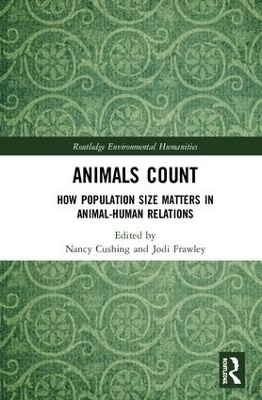
Animals Count
Routledge (Verlag)
978-0-8153-8136-5 (ISBN)
Whether their populations are perceived as too large, just right, too small or non-existent, animal numbers matter to the humans with whom they share environments. Animals in the right numbers are accepted and even welcomed, but when they are seen to deviate from the human-declared set point, they become either enemies upon whom to declare war or victims to be protected.
In this edited volume, leading and emerging scholars investigate for the first time the ways in which the size of an animal population impacts how they are viewed by humans and, conversely, how human perceptions of populations impact animals.
This collection explores the fortunes of amphibians, mammals, insects and fish whose numbers have created concern in settler Australia and examines shifts in these populations between excess, abundance, equilibrium, scarcity and extinction. The book points to the importance of caution in future campaigns to manipulate animal populations, and demonstrates how approaches from the humanities can be deployed to bring fresh perspectives to understandings of how to live alongside other animals.
Nancy Cushing is associate professor in History at the University of Newcastle, Australia. An environmental historian most interested in relations between humans and other animals, she is co-author, with Kevin Markwell, of Snake-bitten, Eric Worrell and the Australian Reptile Park (2010), co-editor of Radical Newcastle (2015) and is writing a history of meat eating in colonial Australia. Jodi Frawley is an honorary research fellow in the Department of History at University of Western Australia, Australia. She is interested in understanding the cultural implications of environmental change in all its guises, from globally mobile biological matter to the ways that race relations impact in the environment. Her current project is a history of fishing in the Great Sandy Strait, Queensland.
1. Why count animals? Nancy Cushing and Jodi Frawley Part I Excess The man from Menindie – D.H. Souter 2. Cane toads as sport: conservation practice and animal ethics at odds Libby Robin 3. Taking locust country Andrea Gaynor 4. On the ant frontier: ontological conflict with Iridomyrmex humilis in post-war Sydney Adam Gall 5. A swarm of sheep: colonizing the Esperance bioregion Nicole Chalmer Part II Abundance Life hath its charms 6. Optimism unlimited: prospects for the pearl-shell, bêche-de-mer and trochus industries on Australia’s Great Barrier Reef, 1860–1940 Rohan Lloyd 7. Swamplands: human-animal relationships in place Emily O’Gorman 8. ‘Pain for Animals. Profit for People’: the campaign against live sheep exports’ Gonzalo Villanueva Part III Equilibrium The Ento(M)-uscian – Emma Carmody 9. "Cunning, intractable, destructive animals": pigs as co-colonisers in the Hunter Valley of New South Wales, 1840–1860 Nancy Cushing 10. Wine worlds are animal worlds, too: native Australian animal vine feeders and interspecies relations in the ecologies that host vineyards Julie McIntyre 11. Defending nature: Animals and militarised landscapes in Australia Ben Wilkie Part IV Scarcity Homecoming (Alpine Strata) – Emma Carmody 12. A slow catastrophe? Fishing for sport and commerce in colonial Victoria David Harris 13. The palatability of pests: redfin in the Murray-Darling Basin Jodi Frawley Part V Extinction ‘Tis the last fly of summer 14. After none: memorialising animal species extinction through monuments Dolly Jørgensen
| Erscheinungsdatum | 27.08.2018 |
|---|---|
| Reihe/Serie | Routledge Environmental Humanities |
| Zusatzinfo | 17 Halftones, black and white; 17 Illustrations, black and white |
| Verlagsort | New York |
| Sprache | englisch |
| Maße | 156 x 234 mm |
| Gewicht | 453 g |
| Themenwelt | Geisteswissenschaften ► Geschichte |
| Naturwissenschaften ► Biologie ► Ökologie / Naturschutz | |
| Sozialwissenschaften ► Soziologie | |
| Technik ► Umwelttechnik / Biotechnologie | |
| ISBN-10 | 0-8153-8136-0 / 0815381360 |
| ISBN-13 | 978-0-8153-8136-5 / 9780815381365 |
| Zustand | Neuware |
| Haben Sie eine Frage zum Produkt? |
aus dem Bereich


